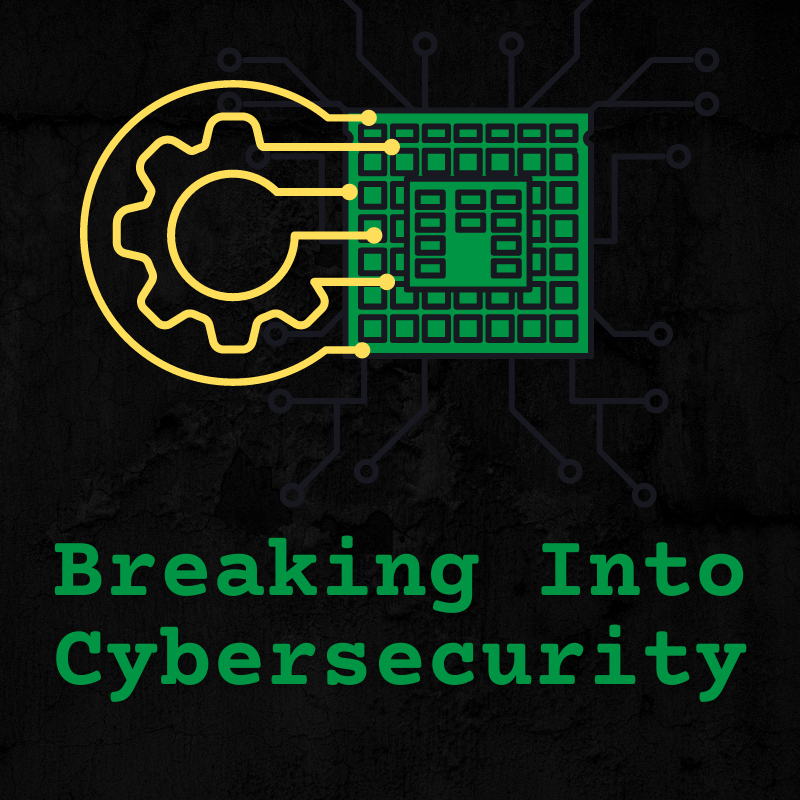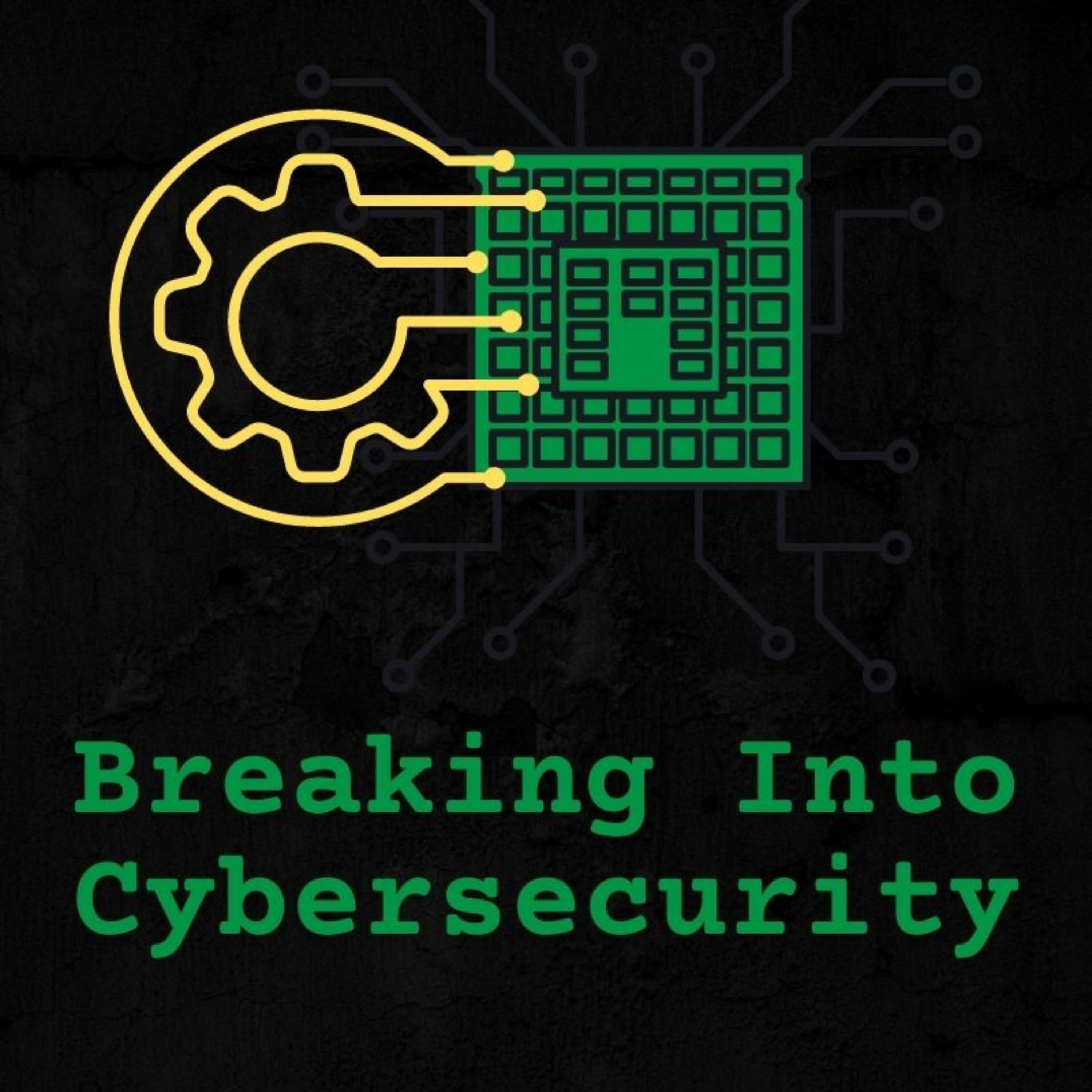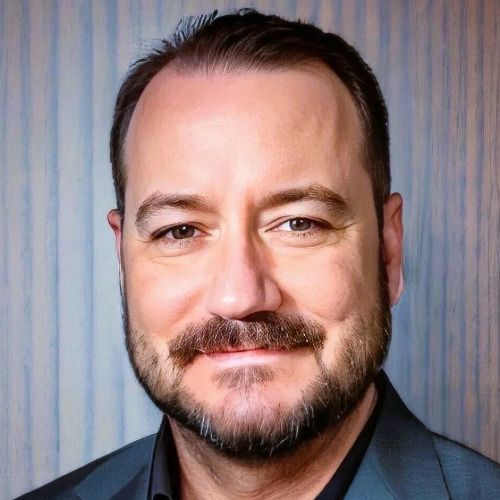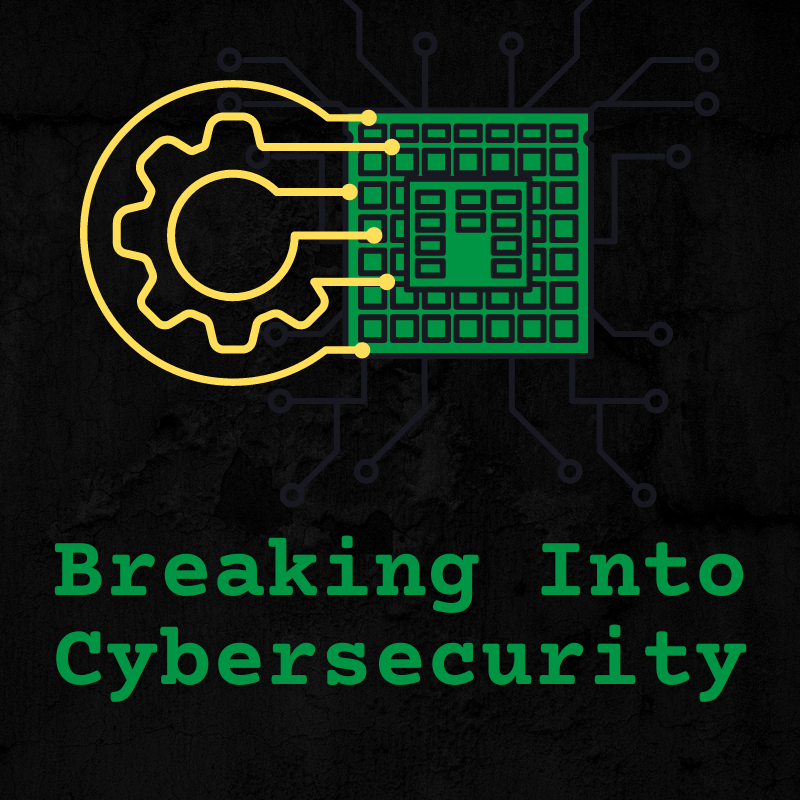full
Breaking into Cybersecurity - Lundon Livingston
Breaking into Cybersecurity - Lundon Livingston
Lundon Livingston on LinkedIn - https://www.linkedin.com/in/lundon/
Sponsored by CPF Coaching LLC - http://cpf-coaching.com
The Breaking into Cybersecurity: It’s a conversation about what they did before, why did they pivot into cyber, what the process was they went through Breaking Into Cybersecurity, how they keep up, and advice/tips/tricks along the way.
The Breaking into Cybersecurity Leadership Series is an additional series focused on cybersecurity leadership and hearing directly from different leaders in cybersecurity (high and low) on what it takes to be a successful leader. We focus on the skills and competencies associated with cybersecurity leadership and tips/tricks/advice from cybersecurity leaders.
Check out our books:
Develop Your Cybersecurity Career Path: How to Break into Cybersecurity at Any Level: https://amzn.to/3443AUI
Hack the Cybersecurity Interview: A complete interview preparation guide for jumpstarting your cybersecurity career https://www.amazon.com/dp/1801816638/
_________________________________________
About the hosts:
Christophe Foulon focuses on helping to secure people and processes with a solid understanding of the technology involved. He has over ten years of experience as an experienced Information Security Manager and Cybersecurity Strategist with a passion for customer service, process improvement, and information security. He has significant experience in optimizing the use of technology while balancing the implications to people, processes, and information security by using a consultative approach.
https://www.linkedin.com/in/christophefoulon/
Find out more about CPF-Coaching at https://www.cpf-coaching.com
- Website: https://www.cyberhubpodcast.com/breakingintocybersecurity
- Podcast: https://feeds.captivate.fm/breaking-into-cybersecurity/
- YouTube: https://www.youtube.com/c/BreakingIntoCybersecurity
- Linkedin: https://www.linkedin.com/company/breaking-into-cybersecurity/
- Twitter: https://twitter.com/BreakintoCyber
- Twitch: https://www.twitch.tv/breakingintocybersecurity
Mentioned in this episode:
Thank you to CPF Coaching for Sponsoring
CPF Coaching: Cybersecurity Leadership and Talent Development Consultant
CPF Coaching: Cybersecurity Leadership and Talent Development Consultant
Transcript
Welcome to another episode of Breaking Into Cybersecurity,
2
:where we talk to cybersecurity
professionals that have broken into
3
:the field within the past five years.
4
:Before we get started, the idea of
this show is to share this with other
5
:cybersecurity professionals so that we can
share these tips and tricks for others.
6
:Looking to break into the field.
7
:Today's guest, London Livingston will
be sharing his path into cybersecurity
8
:and all the tips, drip and all
the tips, tricks, and struggles
9
:along the way, as well as any final
advice that he has for you, London.
10
:You wanna tell our audience a
little bit about your background?
11
:Lundon Livingston: Yes.
12
:Hi Chris and thanks for
having me on your podcast.
13
:Cybersecurity has always been something
that I've wanted to jump into and
14
:I think back as I was, working on
a help desk, over, over 10 years
15
:ago and going to college at the
same time, taking evening courses.
16
:There were classes that I wanted to
take, but I had already made a sacrifice
17
:to take, courses in the mornings
and some courses in the evening.
18
:I just didn't have the time to take
those cybersecurity classes at the time.
19
:Fast forward to this time.
20
:Now, I realize I didn't have to wait
to take cybersecurity courses that
21
:was available through the college.
22
:I didn't realize the amount of
resources and courses and self studying
23
:options that were available to.
24
:Once I broke out of that mindset, I
began doing self-studying and doing
25
:researching and understanding, what was
out there in cybersecurity for me to do.
26
:And ultimately what allowed me to
break that barrier and to jump into
27
:cybersecurity was when I, started,
taking, some short bootcamp courses
28
:as well as I took a scholarship Sans
Academy through Sans Thes Institute.
29
:To me as being a graduate
of A-H-B-C-U College.
30
:So I took about, there were
three certifications that I
31
:took and I learned so much.
32
:And also along with that were the
opportunities through throughout
33
:school opportunities, that
were provided to some of the
34
:organizations to learn technologies.
35
:And I think that allowed me to.
36
:Bridge that gap and to get a better
understanding of which path and which
37
:way I wanted to go in cybersecurity.
38
:Christophe Foulon: So thinking about
which path and where you wanted to go
39
:in cybersecurity, what did you do to
discover which path you wanted to go?
40
:How did you discover what you wanted to
do amongst all ? The Passa or available.
41
:Lundon Livingston: Okay.
42
:So I took some time to
self-reflect on what I knew I.
43
:And the experiences that I've had as a
help desk analyst, a network technician,
44
:a system administrator technical support
specialist, and I realized there was a lot
45
:of alignment and my experience based on IT
operations monitoring doing command line.
46
:Working with the database and a lot of
technical support root cause analysis.
47
:So I started reaching out and networking
with people like you and other
48
:individuals that are in cybersecurity to
understand, what it is that they're doing.
49
:Asking them questions like,
Hey, what did you learn?
50
:What courses did you and not was?
51
:It wasn't that I was trying to copy
them, but I was just trying to figure
52
:out where , what was there for me to
do based on the skills that I had.
53
:Based it up on what I knew and how I
could grow on the skills that I did know.
54
:And it came down to different tools.
55
:Ultimately the root was the mindset.
56
:And not only that was teaching.
57
:I saw a lot of leaders
actually taught courses.
58
:They taught, not necessarily just courses,
but they taught and provided assistance
59
:with certifications with particular tools.
60
:For example, like Splunk and
some some other monitoring tools.
61
:Individuals that I worked with IBM
were very smart with new Relic.
62
:It was a monitoring team, a
monitoring tool that allowed you
63
:to monitor your infrastructure.
64
:Christophe Foulon: I love that
you took the time and you.
65
:Understood the mindset.
66
:that's Something that I haven't heard
a lot of people say right off the
67
:bat, that usually that a lot later.
68
:Were you already in an
IT role at this time?
69
:.
Lundon Livingston: Yes, I was in multiple IT roles.
70
:I sat on a help desk for about five
years, and I was told, London, in
71
:order for you to move up to the next
level to be a system administrator,
72
:you need to get these certifications.
73
:And one of those certifications
was a Linux plus.
74
:They also said I didn't have a
degree, so I went back to school.
75
:I got the associate's degree and
I also achieved the Lennox Plus
76
:compt Linux plus certifications.
77
:And it still didn't allow me to move up.
78
:Five years went by and, I felt like
it was a total waste, and it was very
79
:disappointing to achieve something I.
80
:And be told that, Hey, this is
what you need, from leadership and
81
:not being able to move forward.
82
:So that's when I started getting a
better mindset and growing my, my, my
83
:character seeking personal development,
how I can be a better person, with
84
:my communication skills and how I can
help others and network with others.
85
:And that's what helped me more and more.
86
:Christophe Foulon: I Love that.
87
:Oftentimes I see in this industry
that when you ask someone for advice,
88
:everyone will have different advice.
89
:Everyone will give you different tips.
90
:Everyone will mention different certs, and
yeah you might feel disappointed when you
91
:go out and you do that, especially if it's
your leader telling you that, and then
92
:they don't hold up on their promise, but.
93
:The important thing that, that
you mentioned there is to hold on
94
:to that mindset that everything
wasn't done for nothing.
95
:That, that did learn along the way.
96
:You did improve your skills along the way.
97
:Now it's time to just
integrate those skills into.
98
:The way that you do things so that
you weren't doing the same things
99
:that you were doing five years ago.
100
:you you might be in the same role, but
you're working on different things.
101
:You're working on more advanced things.
102
:Now let's pivot a little bit
to, you decided that help desk
103
:wasn't the right thing for you.
104
:How did you decide what in
cybersecurity you wanted to do?
105
:Lundon Livingston: I forgot
to mention this earlier in our
106
:conversation, and you asked me how
did I, get into cybersecurity and.
107
:Led me to it.
108
:I also started teaching
a cybersecurity course.
109
:I was a assistant I forgot
the title, but I was a teaching
110
:assistant for cybersecurity.
111
:And I forgot the question, Chris.
112
:Christophe Foulon: Okay.
113
:so How did you decide what
role in cybersecurity that
114
:you're interested in doing?
115
:Lundon Livingston: Okay, so the role
that interests me was cybersecurity
116
:risk management, and it examinations
that allowed me to explore.
117
:Like everything cybersecurity, because
in cybersecurity risk management, it
118
:allows me to take a deeper dive and see
the entire cybersecurity universe from
119
:auditing, management's way of leading
their teams, how they select their teams,
120
:what type of training they have, as well
as how often they update their systems.
121
:How they handle vulnerability and
penetration tests, as well as how
122
:provide training, ongoing training to
their employees that kind of opened my
123
:eye and allowed me more discoveries.
124
:Christophe Foulon: So you started to see
that you like this role, and I'm guessing
125
:at this time you were potentially in
another role in your current IT role.
126
:How did you go about getting
that cybersecurity role?
127
:Like all the dirty details, like
how many roles you applied for,
128
:what did you do, all those details.
129
:Lundon Livingston: Okay.
130
:I probably applied for at least maybe
50 to a hundred different roles.
131
:And remember my initial role was a
cybersecurity teaching assistant.
132
:However, that was part-time and.
133
:It took me to reach out to someone to
get coaching and the young lady provided
134
:coaching for me, helped me understand
the language and, told me some things I
135
:needed to research to better understand
how to pursue this opportunity.
136
:I Think that's what ultimately
led me to that role.
137
:It wasn't as painful from the
rejections because I've known to
138
:receive rejections from the past,
when I was looking for a help desk
139
:role or a networking support role.
140
:So the rejections, that's.
141
:I think it took me about six
months to actually land this road
142
:to interview and to be onboarded.
143
:And then I was finally
brought onto the board.
144
:Christophe Foulon: So was this role?
145
:That, that you can try to trace back to
account of just applying to those 50 roles
146
:or were there, was there some networking
involved, some connections involved
147
:that, that help you get to the, in front
of the hiring manager or the recruiter?
148
:Lundon Livingston: So there
wasn't any specific networking
149
:internally from the organization?
150
:I think the only thing that really helped
me was I believe my past experiences,
151
:my, resume on, how I explain, what I did,
what I've accomplished, my achievements.
152
:I think that was the most part.
153
:But, prior to getting the opportunity,
I believe that coaching allowed me to
154
:have the right wording in my resume that.
155
:Was aligned with my skillset,
my personality, and my character
156
:that originally allowed them
to select me for the interview.
157
:Christophe Foulon: So you'd
say this was a role that you.
158
:Only applied via the
applicant tracking system for
159
:Lundon Livingston: So there,
there were multiple roles.
160
:I've been applying for the,
almost the last 10 years.
161
:So over time.
162
:Last time I checked, I think
it was over 300 applications
163
:from this one organization.
164
:Christophe Foulon: Wow.
165
:Talk about
166
:Okay.
167
:This gets interesting,
168
:Lundon Livingston: so ever since I grad,
every since I was in undergrad school
169
:in 2010 and I graduated from WINS Salem
State in:
170
:A student, and most students may not
realize that when you're in school,
171
:there are programs out there that are
available for college students and recent
172
:graduates, as well as other programs,
whether you're in a bootcamp or, as long
173
:as it's education, if you're a student,
I try to take advantage of that for the
174
:long period of time I was in, in school.
175
:. Christophe Foulon: Okay, so what was
this first role and what were, how
176
:was it like onboarding to this first
role coming from an IT background?
177
:Lundon Livingston: Okay, so this
first role it was a it examiner
178
:it it's a federal government role.
179
:I really don't wanna share the
actual name just for privacy.
180
:And basically.
181
:The job had like pretty much
everything that I've been doing
182
:and, things that I wanted to do.
183
:So I was able to express so it, with it
auditing cybersecurity risk management.
184
:A lot of nist guidelines and standards
ff IEC for, financial regulations.
185
:How financial institutions are audited
to make sure they have systems in
186
:place to prevent attacks or to.
187
:Christophe Foulon: Wow.
188
:So that sounds like a
really interesting role.
189
:Did you feel that there were any
struggles onboarding to this role?
190
:Did you feel like you
have to ramp up a lot?
191
:What was it like?
192
:Lundon Livingston: Yes I do feel
that there were some struggles
193
:coming in, into this role.
194
:As far as adapting to the environment
coming from, working with, some private
195
:organizations that started up as a
startup or just, in-house, in a technical
196
:port role, or, because I, I worked
with like IBM and Cisco as a contractor
197
:and those are larger organizations.
198
:I came into this opportunity and it was.
199
:Not necessarily large, but
there was a different approach.
200
:Everything was based on guidelines and
standards and policies and, it was more
201
:trying to understand that and, going
by the books of things to be correct.
202
:And that was like a similar to a
culture shock, it wasn't necessarily
203
:new, but it was different.
204
:Christophe Foulon: Okay, let's we're
approaching the end of the show.
205
:as you advanced give tips for those that
were looking to keep up or any advice
206
:that you would give them based on your
journey of breaking into cybersecurity.
207
:Lundon Livingston: Okay so
from my experience, I had
208
:to know what I want to do.
209
:I had to figure out what it was
I wanted to do based on what I
210
:already knew and what I already had.
211
:And there are technologies out there
that are like the latest and greatest.
212
:You want to keep up with that and stick
with it, you have to be disciplined.
213
:You have to have habit.
214
:Have a habit of, learning about
that particular technology or skill.
215
:And also I spent a majority
of my time volunteering, which
216
:I still do till this day.
217
:I volunteer.
218
:I also teach part-time an intro
to computer networking course.
219
:I've taught other courses at
ECPI, Georgia Tech u Charlotte,
220
:but I've been teaching for the.
221
:Past four years to allow me to
give back to others, to stay
222
:active in this community, to
help others to stay engaging.
223
:And those that that are trying
to get to where I was, I can help
224
:them just from my experience.
225
:And also, you gotta have fun.
226
:For the very first time I
coached a coed soccer team.
227
:And I had no experience.
228
:The kids had no experience, but
we both learned that helped improve
229
:my communication skills, improve
their communication skills, and it
230
:allowed us all to be a team player.
231
:I know some, it seems like everything is
cybersecurity, everything is technical,
232
:but you have to think outside the box
and do what others are not willing to do.
233
:And for me, that was
volunteering and teaching.
234
:There, there are gonna be
opportunities to learn.
235
:You, there, there's so many resources.
236
:You have YouTube, you
have the public library.
237
:You have so many people on
LinkedIn that are willing to help.
238
:Just a matter of communicating
and reaching out.
239
:Christophe Foulon: Thank you so much
for joining and for highlighting that
240
:The transferrable skills from both
volunteering and your previous roles are
241
:highly desirable within cybersecurity,
and you just have to take advantage and
242
:show how you can bring them over there.
243
:Again, all thank you for joining us
today on Breaking Into Cybersecurity.
244
:Please do share this with others.
245
:Looking to break into the field
because that's how we'll develop the
246
:cybersecurity professionals of tomorrow.





